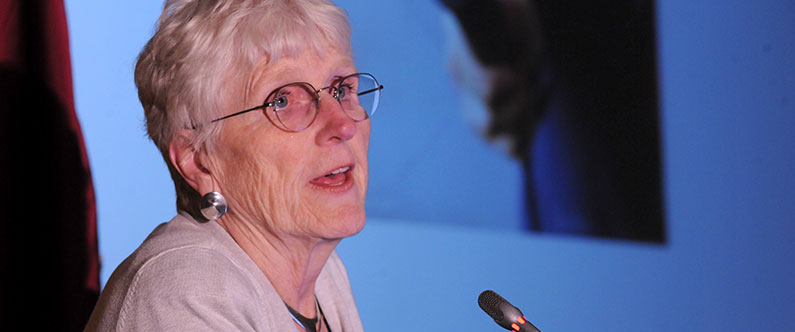Expert Grand Rounds speaker highlights research ethics
 Visiting expert Dr. P. Pearl O’Rourke, associate professor of pediatrics at Harvard Medical School, spoke about methods for ensuring the safety of participants in human subject medical research studies.
Visiting expert Dr. P. Pearl O’Rourke, associate professor of pediatrics at Harvard Medical School, spoke about methods for ensuring the safety of participants in human subject medical research studies.
The best methods for ensuring the safety of participants in human subject medical research studies were discussed at the latest installment of Weill Cornell Medicine-Qatar’s (WCM-Q) Grand Rounds.
Visiting expert Dr. P. Pearl O’Rourke, associate professor of pediatrics at Harvard Medical School, spoke to an audience of fellow health professionals from institutions across Qatar to explain the crucial importance of meticulous observance of guidelines in order to protect human subjects.
Dr. O’Rourke said: “The role of research is incredibly important in modern medicine, but we must always remember that doing research is a privilege, not a right, and we have a duty of care to human subjects that we have to be aware of and take very seriously.”
Research involving human subjects is overseen by committees called Institutional Review Boards (IRB) which monitor, review and decide whether to approve research projects and protocols in order to protect the health of human subjects. IRBs were created in response to a number of notorious medical studies that committed serious abuses against human subjects, such as the 1932-1972 Tuskegee Syphilis Study in which information and treatment was withheld from seriously ill participants. Nowadays, research projects are carefully overseen by IRBs based within individual institutions and a network of national and international regulatory bodies.
Dr. O’Rourke emphasized that researchers must know precisely the nature of their responsibilities. “The principal investigator remains the person responsible for all of the research, compliance with approved protocols and local policies, and reporting – the buck stops with you,” she said. “If someone on your team does something wrong, you are responsible because you assembled your team and it is your duty to supervise them.”
Researchers should ensure they have adequate time, space and money to complete their research, and that all staff involved are knowledgeable about the protocol and their duties. Researchers must ensure compliance with protocols approved by the IRB and not alter them without gaining new approval, and be sure to keep full and accurate records of all of their research. In many countries, failure to meet these criteria can result in large financial penalties and even imprisonment, explained Dr. O’Rourke.
Dr. O’Rourke concluded: “Conducting research is very challenging but if you follow your protocols, supervise your team, do all of your documentation correctly and generally keep your finger on the pulse then it can also be hugely rewarding.”